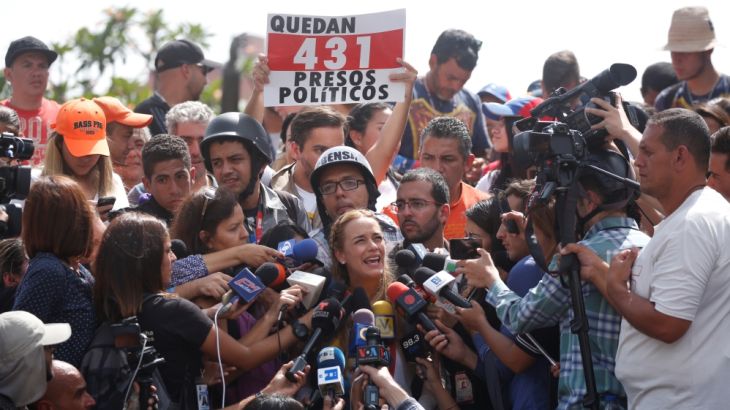Opposition supporters mark 100 days of protests
More than 90 people have been killed and hundreds arrested in ongoing protests against President Maduro.

Galvanised by the release from jail of leader Leopoldo Lopez, Venezuelan opposition supporters have marked 100 days of protests against a socialist government they blame for political repression and economic misery in the country.
Thousands of people gathered in an east Caracas square on Sunday to hear opposition figures including the wife of Lopez, Lilian Tintori, speak.
Many protests over the past 100 days ended in clashes between masked youths and security forces, with more than 90 killed, hundreds arrested and thousands injured since the unrest began at the start of April.
|
|
“We’re not giving up. That Leopoldo is home, fills us with the strength to keep fighting,” said Maria Garcia, a 54-year-old homemaker clad in a white T-shirt bearing his image, as she gathered with friends at the rally.
While Lopez was at home with his two young children, Tintori, who has campaigned for him around the world including during a meeting with US President Donald Trump in the Oval Office, said she was relieved to have her husband home but the fight was not over.
“I can’t say I’m happy when we know our country is suffering, when there are children eating out of the trash, when there is no medicine in Venezuela,” she said, surrounded by opposition legislators.
Lopez, 46, was sentenced to nearly 14 years in jail on charges of inciting violence during 2014 protests against President Nicolas Maduro that led to 43 deaths.
But he was surprisingly granted house arrest and sent home owing to what the Supreme Court called “irregularities” in his case and for health reasons. Lopez looked robust, however, when he later appeared to supporters.
READ MORE: Venezuela – Why I oppose Nicolas Maduro
For more than three months, tear gas, rubber bullets, rocks and petrol bombs have flown between protesters and security forces in hot spots around the OPEC-member nation.
Some, though, believe the crisis needs to be resolved peacefully.
“I actively participated [in the demonstrations] because I believe in having peace in our country. We need to resolve our differences by constitutional means, by having respect, communion, solidarity, and sovereignty,” Alberto Mathison, musician and mechanical engineer, told Al Jazeera.
“I consider that these [anti-government] protests are illegitimate.”
Al Jazeera’s Alessandro Rampietti, reporting from Cucuta on the Colombia-Venezuela border, said the protesters are feeling more confident after Lopez’s release.
“The protesters feel that after months of unrest and streets demonstrations, they are actually having an effect and the government is showing some signs of weakness,” he said.
“This is what they’ve been saying in Caracas [during the demonstration] and they are promising more more street protests and rallies.”
READ MORE: Venezuela – Why I support Nicolas Maduro
Four years of recession have underpinned the protests, as millions of Venezuelans suffer food shortages, runaway inflation and long shopping lines.
People on Sunday held up signs and chanted “Be careful my people, a constituent [vote to change constitution] will mean Maduro for life”.
Some held up Venezuelan flags, and said: “There’s no rice, there’s no flour, what’s in Miraflores [referring to the presidential palace] is cocaine”.
While foes slam him for incompetence and failed socialist policies, Maduro blames an “economic war” against him by pro-opposition businessmen and Washington.
The opposition is organising an unofficial referendum on Maduro next weekend, after which they are promising “zero hour”, a presumed reference to an escalation of tactics that could include a general strike or march on the presidential palace.
Maduro, in turn, is seeking to create a new super body called a Constituent Assembly, which would have powers to rewrite the constitution and dismiss the current opposition-controlled legislature, via a July 30 vote.
|
|